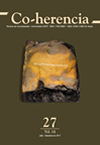Philosophical considerations on the articulation of science and dialectic concepts in the Phänomenologie des Geistes by Hegel
Main Article Content
Keywords
Dialectics, Aristotle, Hegel, experience, science, logics
Abstract
This paper proposes a positive connection between the Hegelian dialectics and the Aristotelian method since the way of using the dialectic method after Aristotle was overlooked throughout the entire scholastic period to be then restored by Kant. Thereby, our interest is to study the Aristotelian influence in the Hegelian conception about the relationship between science and dialectics to prove that Hegel acknowledges philosophical and speculative values in the Aristotelian dialectics. Aristotle’s logic, especially the dialectics logic, can be considered thinking science. A specific contribution to the history of the concept of ‘dialectics’ is intended through this work by understanding the idea of experience as structural key in the relationship between the dialectic method and science.
Downloads
References
Aristóteles (1978). Acerca del Alma. Madrid: Gredos.
Aristóteles (1982). Tratados de Lógica (Órganon) I. Categorías. Tópicos. Sobre las refutaciones sofísticas. Madrid: Gredos.
Aristóteles (1994). Metafísica. Madrid: Gredos.
Aristóteles (1995a). Física. Madrid: Gredos.
Aristóteles (1995b). Tratados de Lógica (Órganon) II. Sobre la interpretación. Analíticos primeros. Analíticos segundos. Madrid: Gredos.
De la Maza, M. (2004). Lógica, Metafísica, Fenomenología: La Fenomenología del Espíritu de Hegel como introducción a la Filosofía Especulativa. Santiago de Chile: Universidad Católica de Chile.
Dussel, E. (1972). La Dialéctica Hegeliana. Mendoza: Ser y Tiempo.
Gadamer, H. G. (1981). La Dialéctica de Hegel. Madrid: Cátedra.
Graham, D. (1987). Aristotle’s Two Sistems. Oxford: Clarendon Press.
Gurvitch, G. (1971). Dialéctica y Sociología. Madrid: Alianza.
Hegel, G. W. F. (1955). Lecciones sobre la Historia de la Filosofía I [Vorlesungen über die Geschichte der Philosophie] (Trad. Wenceslao Roces). México: Fondo de Cultura Económica.
Hegel, G. W. F. (2010). Fenomenología del Espíritu (Trad. Antonio Gómez Ramos). Madrid: Abada. Basado en:
Hegel, G. W. F. (1980). Phänomenologie des Geistes, Vol. IX. En W. Bonsiepen u R. Heede (Ed.), Gesammelte Werke [Obras completas]. In Verbindung mit der Deutschen Forschungsgemeinschaft hrgs. von der Rheinisch – Westfälischen Akademie der Wissenschaften. Felix Meiner: Hamburg.
Hyppolite, J. (1991). Génesis y Estructura de la Fenomenología del Espíritu de Hegel. Barcelona: Península.
Kant, I. (2006). Crítica de la Razón Pura [Kritik der reinen Vernunft] (Trad. Pedro Ribas). México: Tauros.
Nussbaum, M. (2003). The Fragility of Goodnees. Luck and Ethic in Greek Tragedy and Philosophy. Madrid: Machado Libros.
Padilla, M. T. (2007). Zenón de Elea y compañía: Platón y Aristóteles frente a la erística y la sofística. Tópicos, revista de filosofía (Fascículo 33), 119-140.
Sichirollo, L. (1976). Dialéctica. Barcelona: Labor.
Valls Plana, R. (1994). Del Yo al Nosotros: Lectura de la Fenomenología del Espíritu de Hegel. Barcelona: PPU.
Van Eemeren, F. (2002). Argumentación, comunicación y falacias. Una perspectiva pragma-dialéctica. Santiago de Chile: Universidad Católica de Chile.




